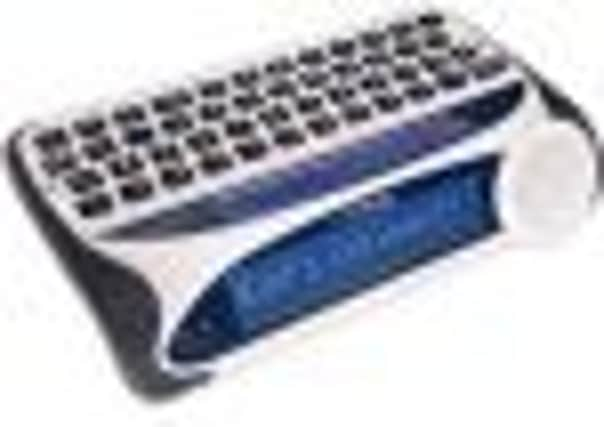FEATURE: How Leamington Rehab Hospital’s friends make the road to recovery smoother for patients


But rather than helping celebrities get over drug or alcohol addiction, the Leamington Rehabilitation Hospital helps ordinary people regain their independence after strokes, accidents or other brain injuries. But while doctors and nurses can take care of basic medical needs, its friends group is instrumental in making patients’ lives more bearable, sometimes with something as simple as a pen that won’t roll away. Reporter Robert Collins spoke to some of its members.
IT could happen at any time. A stroke, accident, or brain haemorrhage could leave any of us unable to walk, talk or perform everyday tasks, struggling to return to work or even to lead a normal home life.
Advertisement
Hide AdAdvertisement
Hide AdIt needn’t be the end; many people recover, but in the weeks and months after accident and emergency units and intensive care comes the long, slow recovery.


In Warwickshire and many neighbouring counties, some of this is likely to be spent at Leamington Rehabilitation Hospital.
Once known as the Heathcote Hospital, today it has a state-of-the-art stroke unit, an acquired brain injury unit and a ward specialising in elderly patients with conditions such as Alzheimer’s and Parkinson’s.
Doctors, nurses, occupational therapists and physiotherapists care for patients with many needs, but a team of volunteers are instrumental in helping patients in other ways.
Advertisement
Hide AdAdvertisement
Hide AdThe League of Friends@the Rehab Hospital is campaigning to raise the profile of the hospital and of its own work, setting up its own website and updating its name.


Chairman Rod Mansell describes the change as moving the group into the 21st century and hopes it will become as well known as Myton Hospice.
He said: “As soon as I mention rehabilitation people think of drink and drugs, which couldn’t be further from the truth.
“We need to be recognised a bit more because of the work we do for the hospital and the patients.”
Advertisement
Hide AdAdvertisement
Hide AdWith 16 members, every month the group spends £2,000 to £3,000. Among items it has paid for is a switch assist machine that helps people who are coming out of a coma to communicate, a £30,000 scanner and a minibus that can transport up to three wheelchairs.


It doesn’t have to be high-tech, or even medical. Purchases can be as low tech as left-handed scissors for someone who has lost the use of their right hand, a square pencil which won’t roll off a table, paintings for the walls of the hospital, and £100 for materials for the hospital’s art department.
Mr Mansell added: “If something is specifically for rehabilitation, the hospital trust will normally purchase it. But if it can be used by virtually anybody, it doesn’t normally come under NHS sponsorship.
“It’s things that people don’t realise they need until they actually go into hospital, such as a book or a newspaper or paintings on the wall.
“We try to make the patients’ lives a bit more bearable.”


Advertisement
Hide AdAdvertisement
Hide AdPeople might imagine it is only the elderly who need such help, but Mr Mansell became involved with the friends’ group after his wife suffered a burst blood vessel in her back in 2002.
In only two hours, it damaged her spine, leaving her paralysed from the chest down. Like a brain haemorrhage, it came out of the blue and could have happened to anyone at any time.
He said: “You never know what’s round the corner. If something like that happens you will be cared for at the Heathcote.
“They can come in on a stretcher but in the past I have seen people walk out with aid and supervision and able to look after themselves in a way.”
Advertisement
Hide AdAdvertisement
Hide AdIf a person’s life can be changed, so can every aspect of their lifestyle. A once active person will struggle to burn the calories they once did if they are in a wheelchair. They risk becoming overweight and suffering more health problems.
With this in mind, the friends group has relaunched its sweets trolley with healthier food, and hopes to take over the hospital’s snack bar.


Sainsbury’s in Saltisford has adopted the friends group as its charity for the year and is working with a nutritionist from the trust to supply healthy food.
It’s easy to be cynical about involving big companies in charity events, but working with sponsors will be central to making the rehabilitation hospital better known.
Advertisement
Hide AdAdvertisement
Hide AdWith Government funding cuts and less money in people’s pockets, Mr Mansell describes fundraising as a nightmare, particularly with better-known charities attracting what money people have.
Another draw will be the Olympics and its sister event the Paralympics. Events co-ordinator Barbara Moreton, who worked at the hospital as a physiotherapy technician for 20 years, is hoping to invite paralympic Boccia player Nigel Murray, who lives in Whitnash, to an event at the supermarket.
She has seen how much people with disabilities can achieve. Her son Richard was a paralympian who competed in the Seoul and Barcelona Olympics. Despite suffering from cerebral palsy, he was a 100m, 200m and 400m runner as well as playing football.
But beyond new logos, websites, the Paralympics and corporate sponsorship, care is still at the heart of the friends’ group. Volunteers work with patients alongside nurses, reading to them and helping in classes such as art therapy.
Advertisement
Hide AdAdvertisement
Hide AdShe said: “It’s a wonderful place. Because it’s a small hospital we are able to be a little bit more one-to-one.
“Quite often patients come from Warwick Hospital to the rehabilitation hospital to make them more independent, so they can go home and have a better quality of life.”